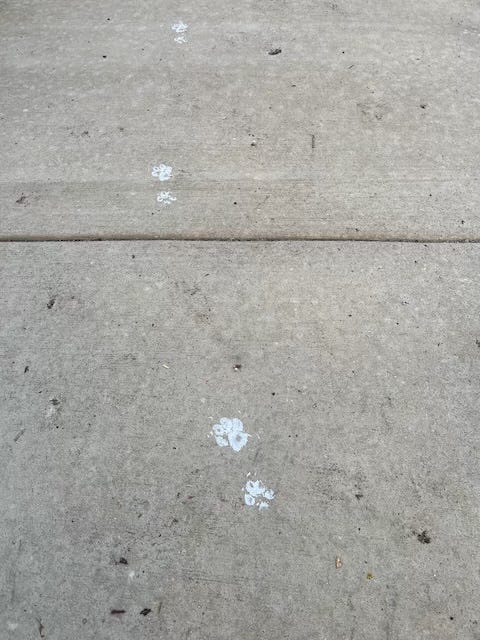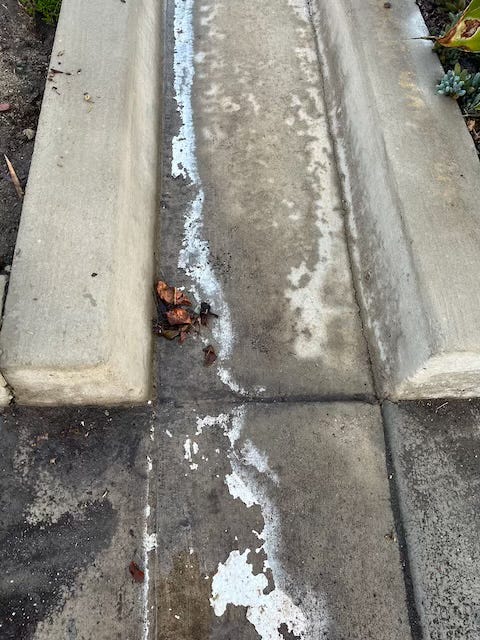Wet Paint, Conviction, and Condemnation
One summer, a bucket of white paint fell off a truck at the entrance to our neighborhood. While there was some attempt at cleanup, a certain amount of paint was left on the edge of the street.
I avoided the area, which was a bit challenging given the runoff settled in the cross-walk I navigated daily with my dog. Plenty of other critters didn't fare so well, as evidenced by all manner of white footprints around it.
Eventually, the hot sun dried the paint and the only evidence of the mishap was a bit of white concrete below the normal dirt and grime of a city street.
Or so I thought.
When rain finally returned to the dry climate, what once was dry became wet. As a result, those white footprints resumed and the paint was again spread along the sidewalk. Encountering the paint and its effects daily, I had to make conscious decisions regarding how to handle it.
Until one morning I realized those conscious reactions had become unconscious habits.
Approach the paint,
lengthen my stride,
tighten my grip on the leash to better guide the dog,
avoid the mess.
It got so I could do it without noticing. But then one morning in particular, as I was hopping over the wet-again paint, my thoughts drifted to other areas of my life with similar stories. What prior mistakes do I rehash in my brain, sometimes over and over again, so much so that it became an automatic behavior?
Plenty.
Too often, I can find myself replaying such experiences in my head, wondering how it went so wrong and what I wish I'd done differently.
It's like I re-wet the paint of the mistake and traipse that sorrow all over the rest of my day, regardless of how long ago it may have been spilled. But this can be a good thing, I thought, right? At least when it pushes me to repentance, perhaps. Yet, this type of rumination can spread messages of bitterness, fear, jealousy, and all manner of negativity.
I walked over, through, and around that wet or dry paint for months before it eventually led me to explore the differences between conviction and condemnation.
Conviction is Good
In my life as a Jesus-follower, recognizing a wrong behavior is conviction and comes from my relationship with God. As the Creator, he has set out certain guidelines for "living my best life." When I bump up against those, or ignore them altogether, his Spirit and Word let me know.
Being aware of my wrongs is often painful, much like touching a hot pan without an oven mitt, but both teach me (hopefully) not to do that again.
For the kind of sorrow God wants us to experience leads us away from sin and results in salvation. There’s no regret for that kind of sorrow. But worldly sorrow, which lacks repentance, results in spiritual death.
—2 Corinthians 7:10 NLT
Conviction prompts me to confession, which restores my relationship with God.
If we confess our sins, he is faithful and just to forgive us…
—1 John 1:9 ESV
Condemnation is Not Good
Being routinely reminded of past mistakes, however, is condemnation and does not come from God.
So now there is no condemnation for those who belong to Christ Jesus.
—Romans 8:1 (NLT)
The Bible calls Satan the accuser and the father of lies—he loves to tells us how awful we are again and again. He wins when we ruminate on those messages.
But wait, there's more.
Satan doesn't just want to make us feel bad, he tempts us to forget how much God loves us and question whether we’re really forgiven at all, despite all that scripture has to say on these topics.
No power in the sky above or in the earth below—indeed, nothing in all creation will ever be able to separate us from the love of God that is revealed in Christ Jesus our Lord.
—Romans 8:39 NLT
I heard it said that rehashing past sins is like re-crucifying Christ for the same thing over and over again. That's not only cruel, it's also self-centered and egotistical. The original text of 1 John 2:12 makes it clear that the verb tense (present participle) began in the past and continues into the future: "I write to you, my children, because your sins are forgiven for the sake of Christ." (GNT)
God wipes the slate (and paint) clean when we repent, so there is no reason to rehash (in our mind or otherwise) what we did or didn’t do in the past.
He has removed our sins as far from us as the east is from the west.
—Psalm 103:12
Instead, we can rest in Jesus having finished the work for us, out of his loving kindness. That, I think, is the only sort of message I should be traipsing all over my days.




